University Report: Analyzing Online Learning in Higher Education
VerifiedAdded on 2020/05/11
|7
|1169
|857
Report
AI Summary
This report analyzes the factors influencing online learning success in higher education, drawing on student self-reported data from various online courses. It examines the perceptions of students regarding their readiness for online learning and the impact of course-level factors, such as qualitative versus quantitative courses and introductory versus advanced classes. The report highlights that while students generally perceive themselves as equipped for online learning, their experiences are also shaped by the nature of the course. The methodology involved pre and post course surveys to gauge students' perspectives. The study emphasizes the importance of considering these factors to enhance the quality of online education, including the need for proper instructions and the use of multiple platforms to reduce student disappointments. The report also critiques the limitations of the study, such as the sample size and the use of self-reported measures, while emphasizing the need for further research to provide more comprehensive insights into the benefits and challenges of online learning.
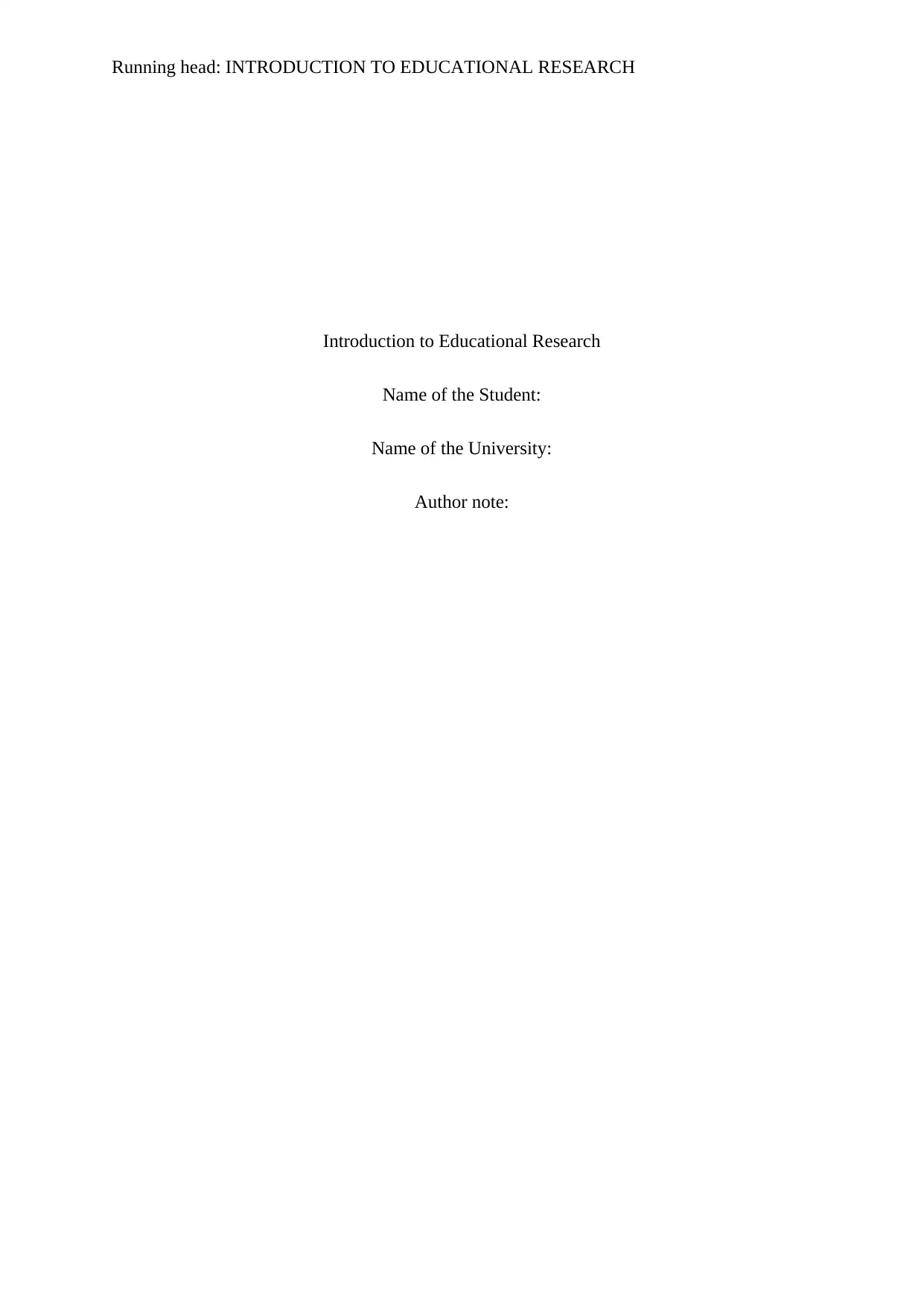
Running head: INTRODUCTION TO EDUCATIONAL RESEARCH
Introduction to Educational Research
Name of the Student:
Name of the University:
Author note:
Introduction to Educational Research
Name of the Student:
Name of the University:
Author note:
Paraphrase This Document
Need a fresh take? Get an instant paraphrase of this document with our AI Paraphraser
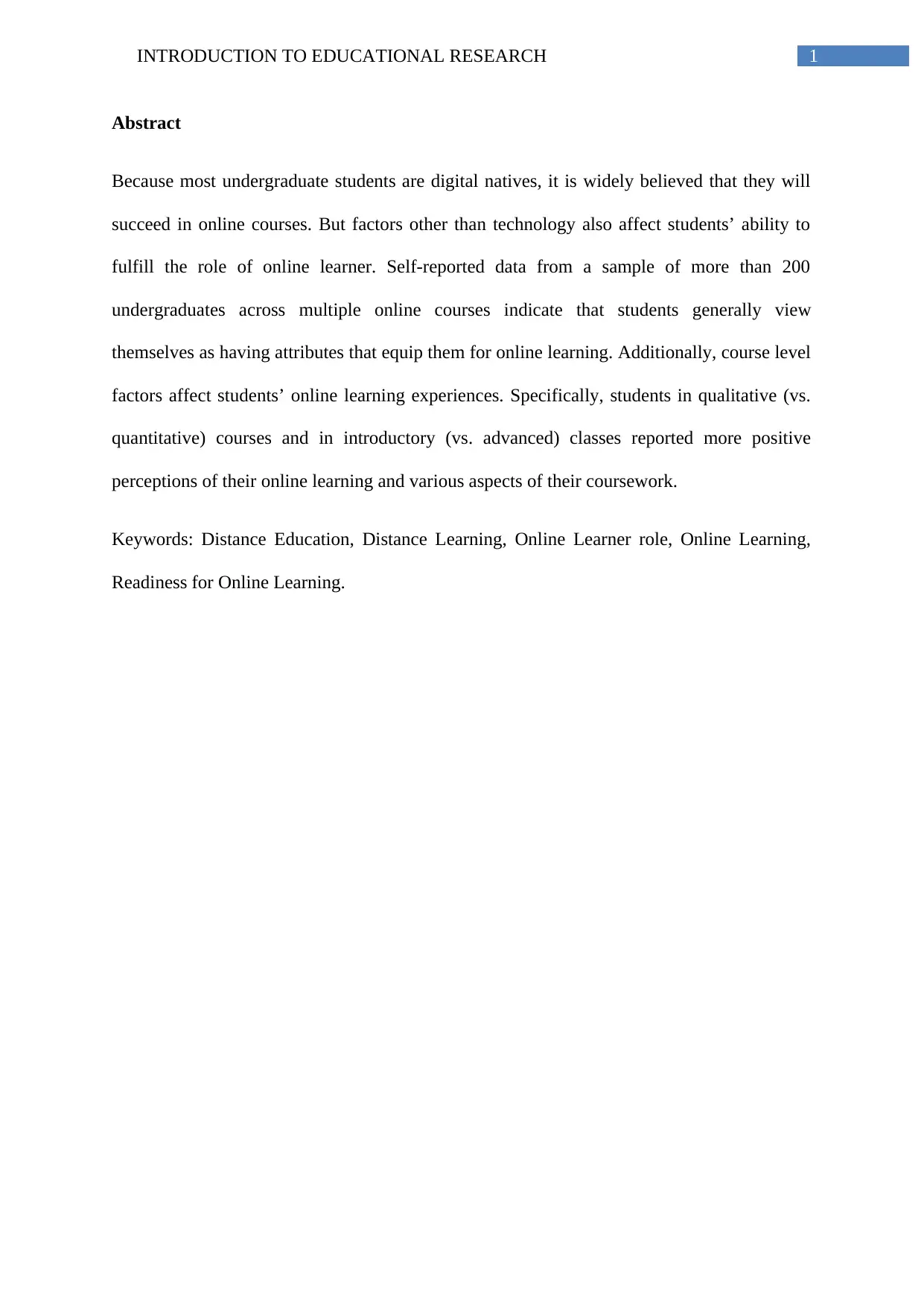
1INTRODUCTION TO EDUCATIONAL RESEARCH
Abstract
Because most undergraduate students are digital natives, it is widely believed that they will
succeed in online courses. But factors other than technology also affect students’ ability to
fulfill the role of online learner. Self-reported data from a sample of more than 200
undergraduates across multiple online courses indicate that students generally view
themselves as having attributes that equip them for online learning. Additionally, course level
factors affect students’ online learning experiences. Specifically, students in qualitative (vs.
quantitative) courses and in introductory (vs. advanced) classes reported more positive
perceptions of their online learning and various aspects of their coursework.
Keywords: Distance Education, Distance Learning, Online Learner role, Online Learning,
Readiness for Online Learning.
Abstract
Because most undergraduate students are digital natives, it is widely believed that they will
succeed in online courses. But factors other than technology also affect students’ ability to
fulfill the role of online learner. Self-reported data from a sample of more than 200
undergraduates across multiple online courses indicate that students generally view
themselves as having attributes that equip them for online learning. Additionally, course level
factors affect students’ online learning experiences. Specifically, students in qualitative (vs.
quantitative) courses and in introductory (vs. advanced) classes reported more positive
perceptions of their online learning and various aspects of their coursework.
Keywords: Distance Education, Distance Learning, Online Learner role, Online Learning,
Readiness for Online Learning.
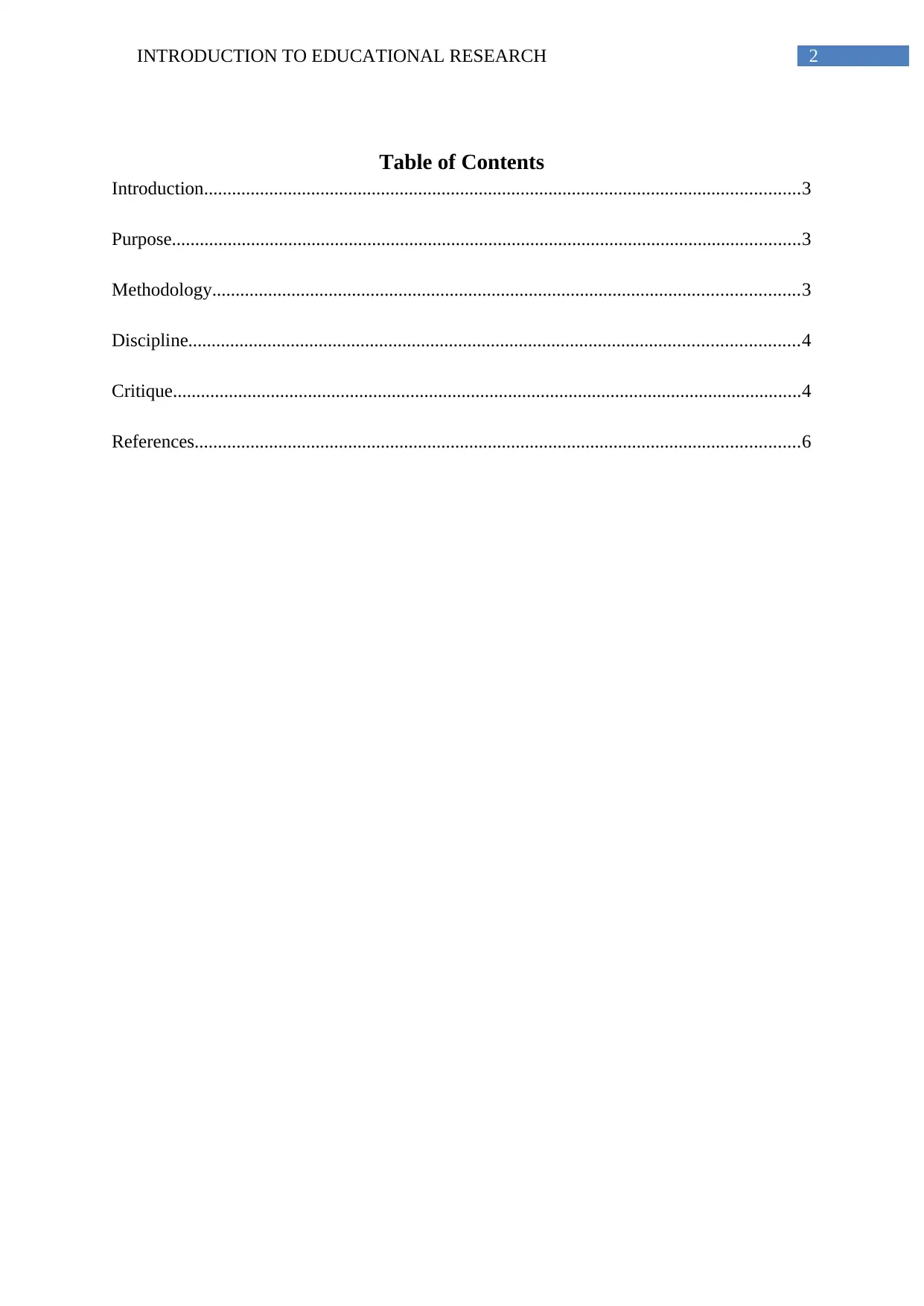
2INTRODUCTION TO EDUCATIONAL RESEARCH
Table of Contents
Introduction................................................................................................................................3
Purpose.......................................................................................................................................3
Methodology..............................................................................................................................3
Discipline...................................................................................................................................4
Critique.......................................................................................................................................4
References..................................................................................................................................6
Table of Contents
Introduction................................................................................................................................3
Purpose.......................................................................................................................................3
Methodology..............................................................................................................................3
Discipline...................................................................................................................................4
Critique.......................................................................................................................................4
References..................................................................................................................................6
⊘ This is a preview!⊘
Do you want full access?
Subscribe today to unlock all pages.

Trusted by 1+ million students worldwide
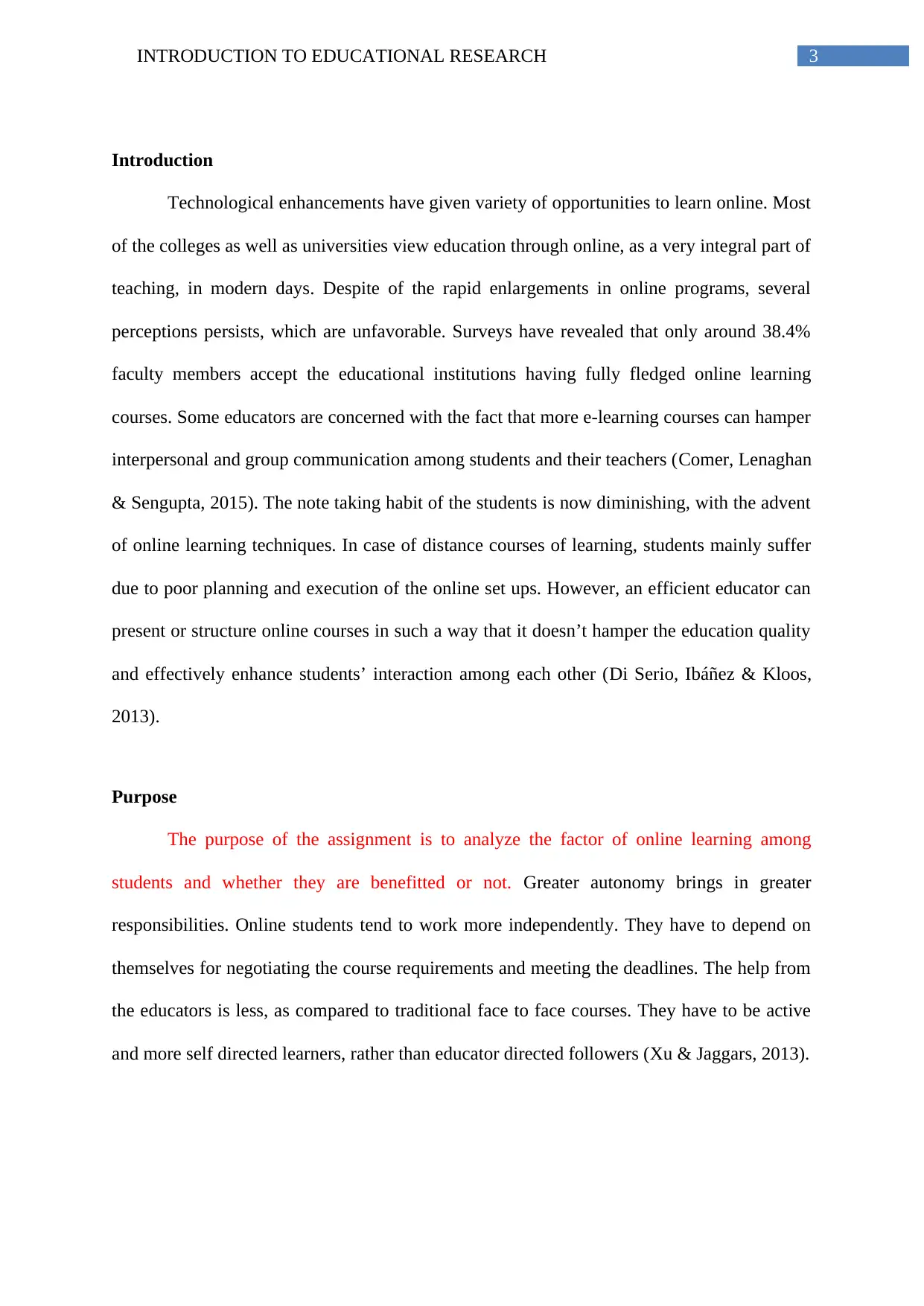
3INTRODUCTION TO EDUCATIONAL RESEARCH
Introduction
Technological enhancements have given variety of opportunities to learn online. Most
of the colleges as well as universities view education through online, as a very integral part of
teaching, in modern days. Despite of the rapid enlargements in online programs, several
perceptions persists, which are unfavorable. Surveys have revealed that only around 38.4%
faculty members accept the educational institutions having fully fledged online learning
courses. Some educators are concerned with the fact that more e-learning courses can hamper
interpersonal and group communication among students and their teachers (Comer, Lenaghan
& Sengupta, 2015). The note taking habit of the students is now diminishing, with the advent
of online learning techniques. In case of distance courses of learning, students mainly suffer
due to poor planning and execution of the online set ups. However, an efficient educator can
present or structure online courses in such a way that it doesn’t hamper the education quality
and effectively enhance students’ interaction among each other (Di Serio, Ibáñez & Kloos,
2013).
Purpose
The purpose of the assignment is to analyze the factor of online learning among
students and whether they are benefitted or not. Greater autonomy brings in greater
responsibilities. Online students tend to work more independently. They have to depend on
themselves for negotiating the course requirements and meeting the deadlines. The help from
the educators is less, as compared to traditional face to face courses. They have to be active
and more self directed learners, rather than educator directed followers (Xu & Jaggars, 2013).
Introduction
Technological enhancements have given variety of opportunities to learn online. Most
of the colleges as well as universities view education through online, as a very integral part of
teaching, in modern days. Despite of the rapid enlargements in online programs, several
perceptions persists, which are unfavorable. Surveys have revealed that only around 38.4%
faculty members accept the educational institutions having fully fledged online learning
courses. Some educators are concerned with the fact that more e-learning courses can hamper
interpersonal and group communication among students and their teachers (Comer, Lenaghan
& Sengupta, 2015). The note taking habit of the students is now diminishing, with the advent
of online learning techniques. In case of distance courses of learning, students mainly suffer
due to poor planning and execution of the online set ups. However, an efficient educator can
present or structure online courses in such a way that it doesn’t hamper the education quality
and effectively enhance students’ interaction among each other (Di Serio, Ibáñez & Kloos,
2013).
Purpose
The purpose of the assignment is to analyze the factor of online learning among
students and whether they are benefitted or not. Greater autonomy brings in greater
responsibilities. Online students tend to work more independently. They have to depend on
themselves for negotiating the course requirements and meeting the deadlines. The help from
the educators is less, as compared to traditional face to face courses. They have to be active
and more self directed learners, rather than educator directed followers (Xu & Jaggars, 2013).
Paraphrase This Document
Need a fresh take? Get an instant paraphrase of this document with our AI Paraphraser
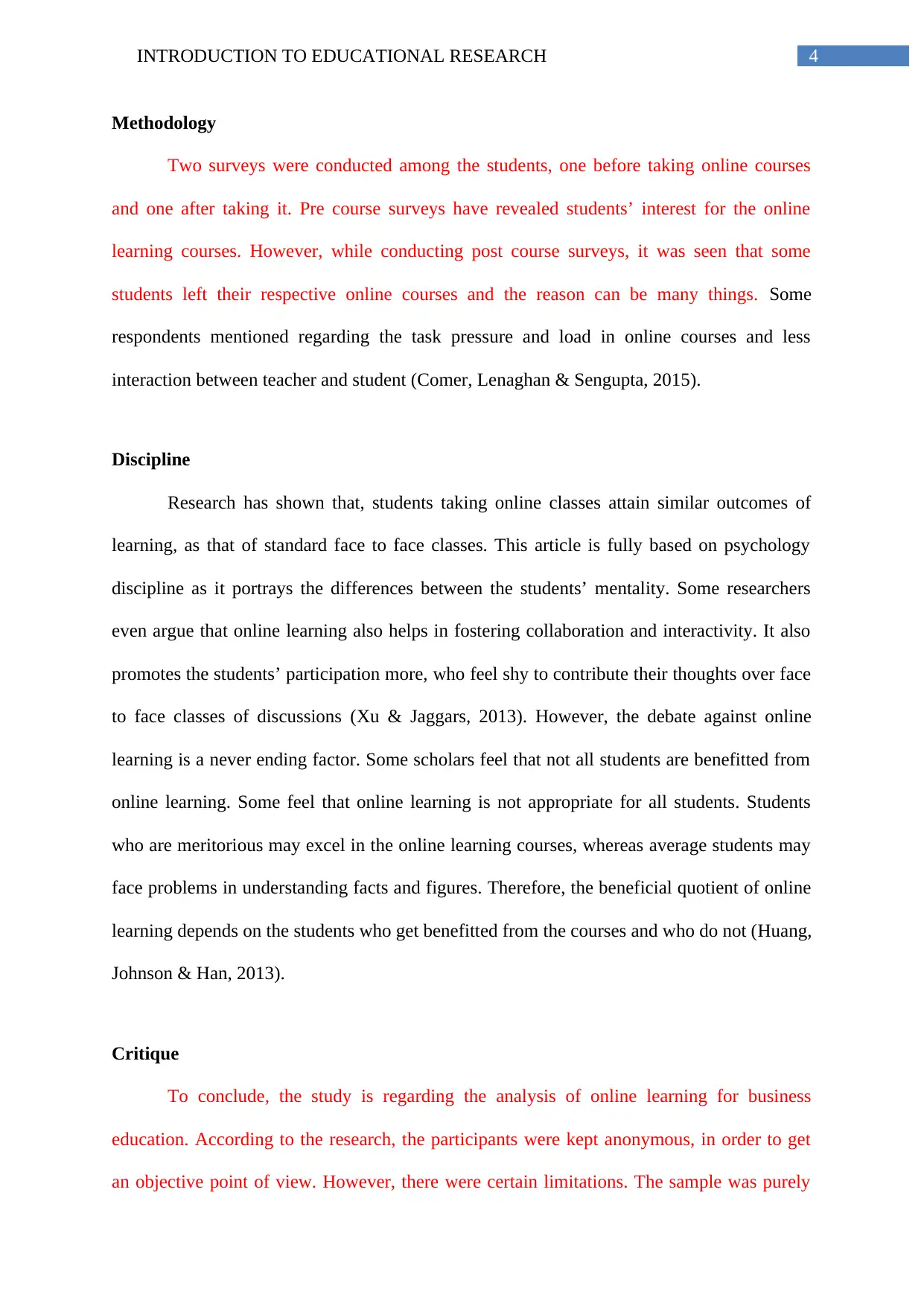
4INTRODUCTION TO EDUCATIONAL RESEARCH
Methodology
Two surveys were conducted among the students, one before taking online courses
and one after taking it. Pre course surveys have revealed students’ interest for the online
learning courses. However, while conducting post course surveys, it was seen that some
students left their respective online courses and the reason can be many things. Some
respondents mentioned regarding the task pressure and load in online courses and less
interaction between teacher and student (Comer, Lenaghan & Sengupta, 2015).
Discipline
Research has shown that, students taking online classes attain similar outcomes of
learning, as that of standard face to face classes. This article is fully based on psychology
discipline as it portrays the differences between the students’ mentality. Some researchers
even argue that online learning also helps in fostering collaboration and interactivity. It also
promotes the students’ participation more, who feel shy to contribute their thoughts over face
to face classes of discussions (Xu & Jaggars, 2013). However, the debate against online
learning is a never ending factor. Some scholars feel that not all students are benefitted from
online learning. Some feel that online learning is not appropriate for all students. Students
who are meritorious may excel in the online learning courses, whereas average students may
face problems in understanding facts and figures. Therefore, the beneficial quotient of online
learning depends on the students who get benefitted from the courses and who do not (Huang,
Johnson & Han, 2013).
Critique
To conclude, the study is regarding the analysis of online learning for business
education. According to the research, the participants were kept anonymous, in order to get
an objective point of view. However, there were certain limitations. The sample was purely
Methodology
Two surveys were conducted among the students, one before taking online courses
and one after taking it. Pre course surveys have revealed students’ interest for the online
learning courses. However, while conducting post course surveys, it was seen that some
students left their respective online courses and the reason can be many things. Some
respondents mentioned regarding the task pressure and load in online courses and less
interaction between teacher and student (Comer, Lenaghan & Sengupta, 2015).
Discipline
Research has shown that, students taking online classes attain similar outcomes of
learning, as that of standard face to face classes. This article is fully based on psychology
discipline as it portrays the differences between the students’ mentality. Some researchers
even argue that online learning also helps in fostering collaboration and interactivity. It also
promotes the students’ participation more, who feel shy to contribute their thoughts over face
to face classes of discussions (Xu & Jaggars, 2013). However, the debate against online
learning is a never ending factor. Some scholars feel that not all students are benefitted from
online learning. Some feel that online learning is not appropriate for all students. Students
who are meritorious may excel in the online learning courses, whereas average students may
face problems in understanding facts and figures. Therefore, the beneficial quotient of online
learning depends on the students who get benefitted from the courses and who do not (Huang,
Johnson & Han, 2013).
Critique
To conclude, the study is regarding the analysis of online learning for business
education. According to the research, the participants were kept anonymous, in order to get
an objective point of view. However, there were certain limitations. The sample was purely
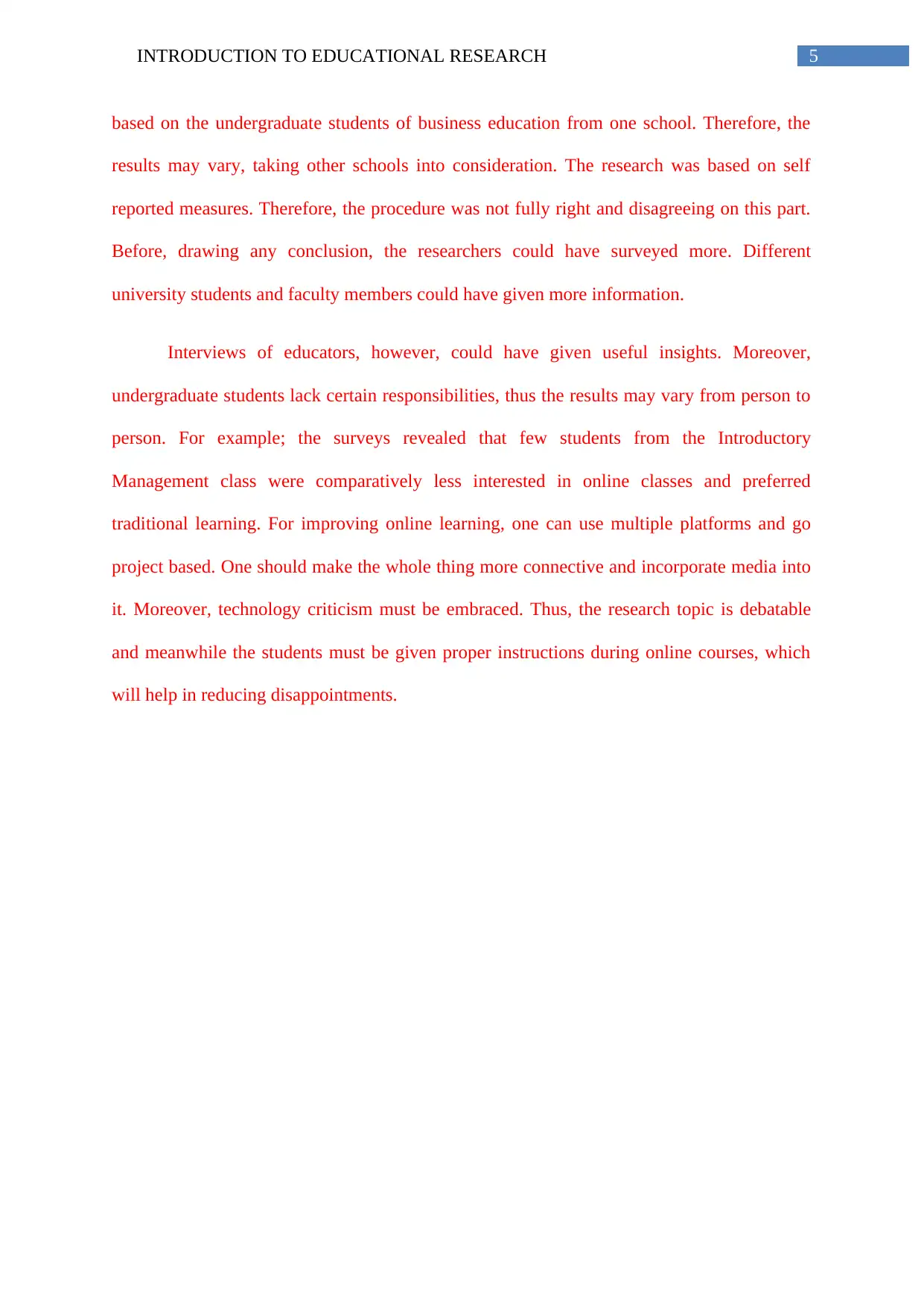
5INTRODUCTION TO EDUCATIONAL RESEARCH
based on the undergraduate students of business education from one school. Therefore, the
results may vary, taking other schools into consideration. The research was based on self
reported measures. Therefore, the procedure was not fully right and disagreeing on this part.
Before, drawing any conclusion, the researchers could have surveyed more. Different
university students and faculty members could have given more information.
Interviews of educators, however, could have given useful insights. Moreover,
undergraduate students lack certain responsibilities, thus the results may vary from person to
person. For example; the surveys revealed that few students from the Introductory
Management class were comparatively less interested in online classes and preferred
traditional learning. For improving online learning, one can use multiple platforms and go
project based. One should make the whole thing more connective and incorporate media into
it. Moreover, technology criticism must be embraced. Thus, the research topic is debatable
and meanwhile the students must be given proper instructions during online courses, which
will help in reducing disappointments.
based on the undergraduate students of business education from one school. Therefore, the
results may vary, taking other schools into consideration. The research was based on self
reported measures. Therefore, the procedure was not fully right and disagreeing on this part.
Before, drawing any conclusion, the researchers could have surveyed more. Different
university students and faculty members could have given more information.
Interviews of educators, however, could have given useful insights. Moreover,
undergraduate students lack certain responsibilities, thus the results may vary from person to
person. For example; the surveys revealed that few students from the Introductory
Management class were comparatively less interested in online classes and preferred
traditional learning. For improving online learning, one can use multiple platforms and go
project based. One should make the whole thing more connective and incorporate media into
it. Moreover, technology criticism must be embraced. Thus, the research topic is debatable
and meanwhile the students must be given proper instructions during online courses, which
will help in reducing disappointments.
⊘ This is a preview!⊘
Do you want full access?
Subscribe today to unlock all pages.

Trusted by 1+ million students worldwide
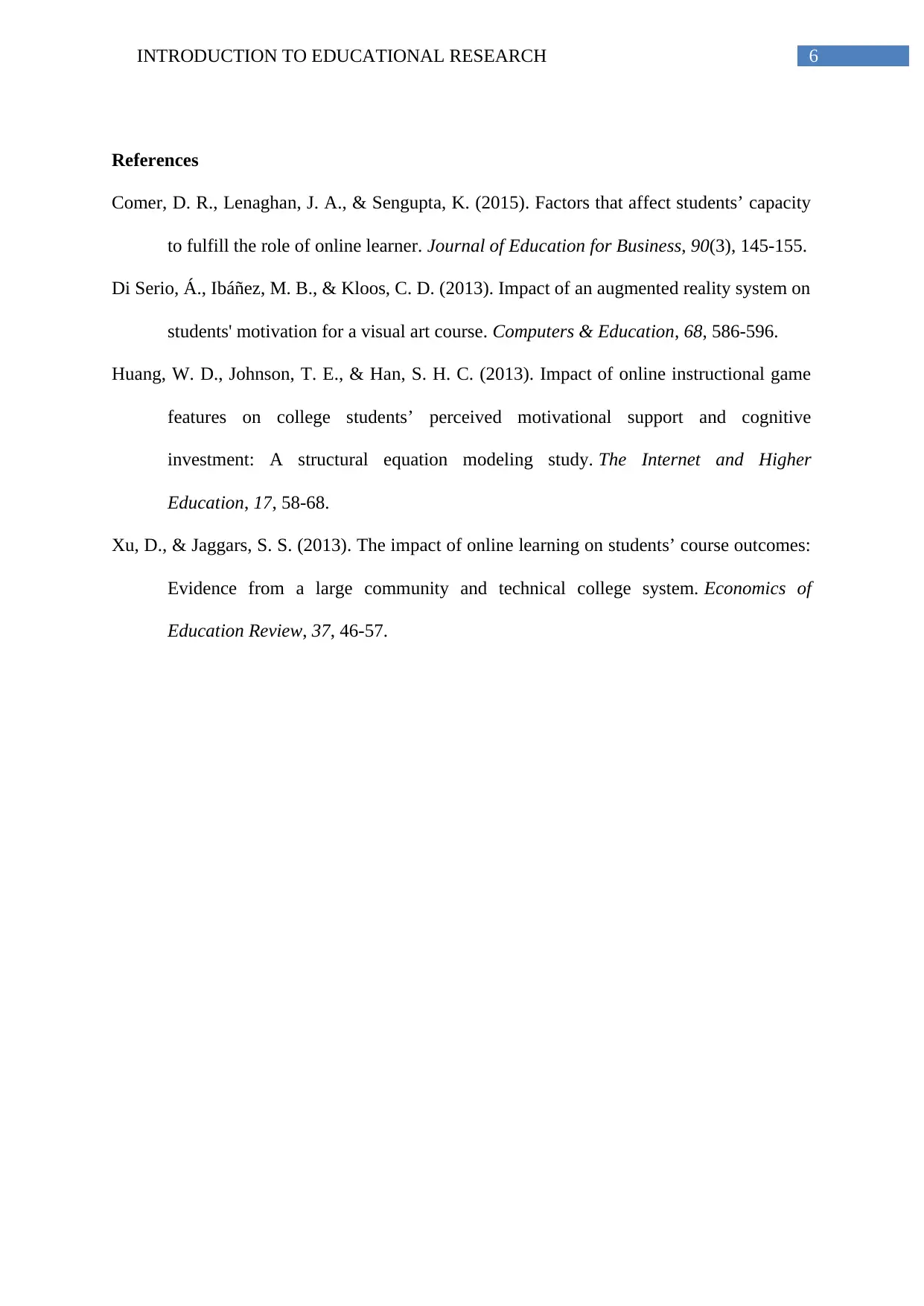
6INTRODUCTION TO EDUCATIONAL RESEARCH
References
Comer, D. R., Lenaghan, J. A., & Sengupta, K. (2015). Factors that affect students’ capacity
to fulfill the role of online learner. Journal of Education for Business, 90(3), 145-155.
Di Serio, Á., Ibáñez, M. B., & Kloos, C. D. (2013). Impact of an augmented reality system on
students' motivation for a visual art course. Computers & Education, 68, 586-596.
Huang, W. D., Johnson, T. E., & Han, S. H. C. (2013). Impact of online instructional game
features on college students’ perceived motivational support and cognitive
investment: A structural equation modeling study. The Internet and Higher
Education, 17, 58-68.
Xu, D., & Jaggars, S. S. (2013). The impact of online learning on students’ course outcomes:
Evidence from a large community and technical college system. Economics of
Education Review, 37, 46-57.
References
Comer, D. R., Lenaghan, J. A., & Sengupta, K. (2015). Factors that affect students’ capacity
to fulfill the role of online learner. Journal of Education for Business, 90(3), 145-155.
Di Serio, Á., Ibáñez, M. B., & Kloos, C. D. (2013). Impact of an augmented reality system on
students' motivation for a visual art course. Computers & Education, 68, 586-596.
Huang, W. D., Johnson, T. E., & Han, S. H. C. (2013). Impact of online instructional game
features on college students’ perceived motivational support and cognitive
investment: A structural equation modeling study. The Internet and Higher
Education, 17, 58-68.
Xu, D., & Jaggars, S. S. (2013). The impact of online learning on students’ course outcomes:
Evidence from a large community and technical college system. Economics of
Education Review, 37, 46-57.
1 out of 7
Related Documents
Your All-in-One AI-Powered Toolkit for Academic Success.
+13062052269
info@desklib.com
Available 24*7 on WhatsApp / Email
![[object Object]](/_next/static/media/star-bottom.7253800d.svg)
Unlock your academic potential
Copyright © 2020–2026 A2Z Services. All Rights Reserved. Developed and managed by ZUCOL.




